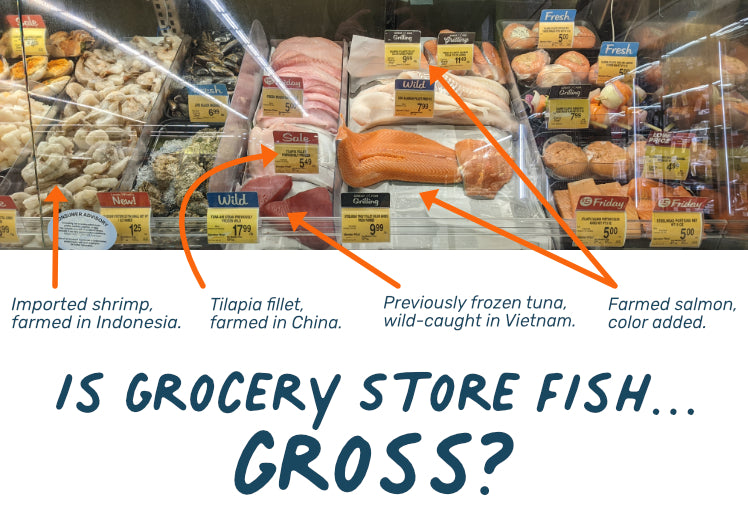
Some people are lucky enough to live by a fishing port, or to have a local fishmonger. The rest of us have few other options than to buy our Seafood at the local grocery. But sometimes that’s a really bad idea. Here are the top five reasons why not to eat grocery store fish.
Top Five Reasons to Avoid Grocery Store Fish
Mislabeling is a Big Problem in Grocery Stores
It’s called “fish fraud”. Between 2010 and 2012, Oceana, a conservation group, took 1,215 seafood samples from 674 retail outlets in 21 states. They found that 33 percent of the DNA tested was mislabeled. Fraud has become rampant due to the fact that the U.S. imports 90 percent of its seafood and only inspects 2 percent of it.
2. It May Have Been Raised on Antibiotics
Each year in the United States, antibiotic-resistant germs sicken about 2 million people and kill about 23,000, according to the Infectious Diseases Society of America. Arizona State University researchers bought and analyzed 27 samples of seafood that originated in 11 countries. They found detectable amounts of antibiotics in the seafood samples. While antibiotic levels in the seafood samples were below U.S. Food and Drug Administration limits, those levels can still promote the development of antibiotic resistance, the researchers said.
3. You Don’t Know How Long Grocery Store Fish Has Been on Display
If you live nowhere within miles of any body of water, your “fresh” fish isn't fresh. Some stores state "Previously Frozen”, others conveniently skip that label or place it in tiny print. So how long has it sat there unfrozen prior to going into your cart? Industry standard is 7-10 days, resulting in a barely acceptable, fishy-smelling product.(see next)

4. It Can Smell
Fresh out of the ocean, fish have no odor except for that of the sea. Leave them out in the air for a few days and all bets are off. Ever wonder why grocery store fish counters smell distinctly fishy? It’s because of a molecule called TMAO. When fish die and are exposed to air, like in a fish counter display, this molecule begins to break down and create that unique stink.
5. Wild-Caught, American Seafood is Rare
Grocery stores import over 90% of the Seafood they sell. Of the rest, most is farmed. That means True wild-caught American seafood, from well-regulated US waters, is very rare… especially when it comes to salmon. Wild-caught fish is always a smarter choice than farmed, both for health and flavor. And when you buy American fish, you are supporting American Fishermen.
Sea to Table is Different
Before you let all this information freak you out and cause you to swear off seafood forever, remember there is an alternative. Sea to Table sells only wild-caught, sustainable American fish, frozen at the peak of freshness. There’s no waste, no smell, and no dangerous chemicals. We’re helping Americans skip the fish counter but still get in those two servings of seafood a week that are so important for your health.
← Older post Newer post →

